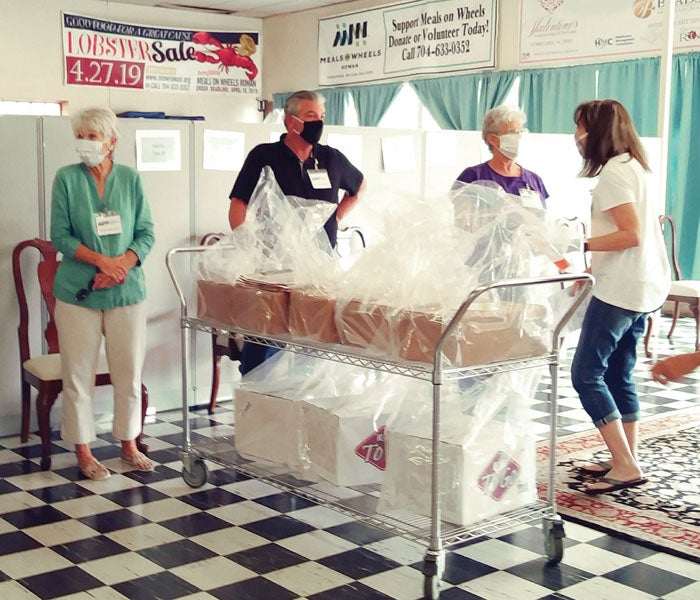‘Critical needs’: COVID-19 Relief Fund helped Meals on Wheels deliver groceries to seniors
Published 12:00 am Sunday, July 12, 2020

- Meals on Wheels staff and volunteers prepare to deliver 5-meal boxes to each participant.
SPENCER — Meals on Wheels has always served homebound seniors, but its services have expanded and been more critical than every during the COVID-19 pandemic, says United Way Executive Director Jenny Lee.
The organization has continued to deliver meals to its homebound clients while adding on services that include delivering fresh produce, groceries and supplies. Rowan County Meals on Wheels Executive Director Cindy Fink counts 408 individual who have received groceries and supplies and 122 who have received U.S. Department of Agriculture food boxes — both of which are made possible through the United Way’s COVID-19 Relief Fund and are in addition to the 1,500 to 1,600 meals delivered each week to homebound seniors.
“Once the COVID-19 impact created more critical needs, the funds were able to ensure folks that have a compromised immune system were able to get the food that they need,” Lee said. “That, in itself, is worth every dollar that goes to the program.”
Meals on Wheels received $5,000 in the first round of COVID-19 Relief Fund grants and $10,000 in a follow-up grant to continue the grocery program. The USDA food boxes were a partnership between Meals on Wheels and Rowan Helping Ministries also made possible through a relief fund grant.
Grocery delivery started with comfort calls to clients of Meals on Wheels in which volunteers asked about needs.
“And we found that a lot of folks needed groceries who could not or should not get out. It actually gave us a chance to talk a little bit about what they want, too. … Many people don’t ask for any fruit or produce,” Fink said, noting that volunteers encouraged seniors to opt for healthier choices.
The average grocery purchase was $45 to $75, Fink said. And the grant allowed Meals on Wheels to provide those grocery list purchases for free.
But Meals on Wheels also helped with household supplies, too. When supplies of toilet paper were short, the organization secured a relationship with a vendor and kept a stock at its office. And it simultaneously needed to run its regularly delivery services, creating a multi-tiered operation.
“We’ve been trying to meet people where they are … We understand that COVID has impacted them and so we are asking, ‘How can we fill in to support you,’ ” Fink said.
At Nazareth Child and Family Connection, meanwhile, COVID-19 relief funds provided a stipend to foster families with kids who were suddenly at home instead of school, where they would otherwise receive meals.
“It was an additional expense for foster families,” Lee said. “The stipend helped to alleviate additional pressure and stress.”
All told, the United Way’s COVID-19 Relief Fund has distributed $88,864 in grants. Those funds can be used for programs that provide help with rend, food, utilities and medical expenses. But economic fallout from COVID-19 has also affected business operations of nonprofits who provide those services, and there’s an increasing worry a continuing COVID-19 outbreak will leave nonprofits searching for funding to keep providing their basic services.
Fink, for example, says Meals on Wheels relies heavily on fundraising, but raising money through events is difficult to impossible amid COVID-19 restrictions. Likewise, Lee says, other nonprofits that received Paycheck Protection Plan funding previously to keep operations going are not yet able to do so again. So, Lee predicts an uptick in applications that cite nonprofit business disruptions, another allowable cause under the COVID-19 Relief Fund, as the reason.
She said there are six grant applications currently pending, and that some are for nonprofit disruptions to business.
The fund will continue to provide grants on a rolling basis as funding is available. So, far the fund has raised $234,413, which does not include up to $120,000 in matching funds the United Way says it will provide.
Lee said the United Way is being intentional about choosing grantees. It wouldn’t be responsible to collect and then quickly distribute that money because of the likelihood that the COVID-19 pandemic won’t subside soon.
“We need to make sure that our resources are stretched out because there are just so many unknowns about what the next months will bring,” Lee said. “If it’s like it’s forecasted, we’ll see a whole lot of folks for payroll assistance and we need to make sure those resources are still available.”
Nonprofits can obtain more information about applying by visiting rowanunitedway.org or calling the office at 704-633-1802.
Anyone interested in making a donation can do so at rowanunitedway.org, text the word “RELIEF” to 704-286-1011 or mail a contribution to the United Way at 131 West Innes St., Suite 201, Salisbury, N.C. 28144. Those mailing donations should address them to the attention of the COVID-19 Relief Fund. Those making a donation online should include a note in the comment section saying it’s for the COVID-19 Relief Fund.
The most recent donations are as follows:
• Edward and Susan Norvell, $200
• Beverly Dillard, $35
• Anonymous, $250
• New Sarum Brewing (from T-shirt sales), $3,050
• New Sarum Brewing, (from Cheerwine Lager sales), $6,000
• Brian and Amy Miller, $500
• Lane Bailey, $50, in honor of Nancy Corriher

